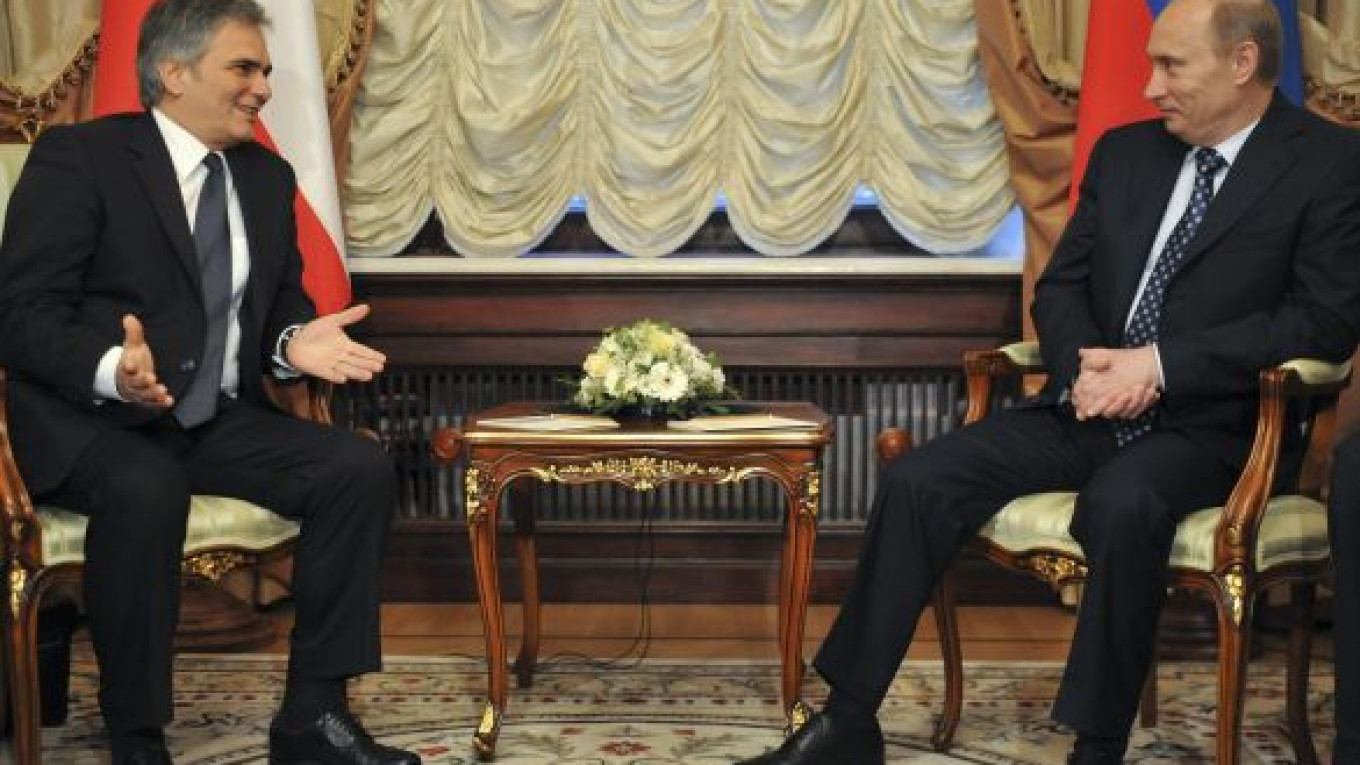Russia and Austria agreed to work fast to complete talks to lay the South Stream pipeline, which would make Russian gas exports to Europe more reliable, Prime Minister Vladimir Putin said Wednesday, marking further progress for the ambitious project.
He made the statement after a meeting in Moscow with his Austrian counterpart, Federal Chancellor Werner Faymann, where they also reached agreements in oil trade and on air flights.
Gazprom and Italy’s Eni, which back the South Stream pipeline, plan for it to terminate in Austria, but talks with Vienna have taken longer than they did with most other partner countries. Putin said the chancellor agreed to set the “tightest deadline” to strike a deal.
Faymann said the Austrian government regarded South Stream as meeting the country’s national interests and authorized such talks two weeks ago.
The chancellor also said the pipeline was not a competitor to Nabucco, a project to import gas from the Caspian Sea and Central Asia to alleviate the continent’s dependency on Russian energy. Privately controlled Austrian energy company OMV leads the Nabucco effort.
Slovenia is the only other transit country that has not yet signed up to take part in South Stream. Putin is scheduled to meet with Slovenian Prime Minister Borut Pahor on Saturday.
South Stream, which will have the capacity to transport 63 billion cubic meters of gas per year, will run from the Russian coast under the Black Sea to Bulgaria, then bifurcate to cross several other countries for Italy and Austria.
Russia wants the pipeline to circumvent Ukraine, which currently transits 80 percent of Gazprom’s Europe-bound exports. Gas trade spats between the countries have disrupted the transit several times, most badly and recently in January.
One of the goals for South Stream is to “discipline” current transit countries, Putin said.
“I very much count on our main transit partner, Ukraine, to execute all of its contract obligations,” he said at a news conference after the meeting.
Putin said he could not rule out a repetition of last winter’s standoff, which interrupted gas supplies to Europe for almost three weeks. If Ukraine does not pay for its domestic supplies and taps into the transit flows, Russia will reduce the volumes sent through Ukraine, he said.
On other issues, Putin said he supported extending the Druzhba pipeline, a major export route for Russian oil, to an Austrian refinery from its current terminus in the Slovak capital, Bratislava.
The idea to build another stretch came from Austria and Slovakia and would require additional oil supplies from Russia.
Faymann said Russian air traffic authorities extended the terms of flights to Russia for Austrian Airlines, which has recently been a stumbling block in relations. The extension is valid to Feb. 1 and will be used to renegotiate the current deal, he said.
The airline has been flying to Russia under an agreement between the two governments, which is typical for the industry. But it was taken over by Germany’s Lufthansa earlier this year, prompting Russia to question the agreement with Austria.
A Message from The Moscow Times:
Dear readers,
We are facing unprecedented challenges. Russia's Prosecutor General's Office has designated The Moscow Times as an "undesirable" organization, criminalizing our work and putting our staff at risk of prosecution. This follows our earlier unjust labeling as a "foreign agent."
These actions are direct attempts to silence independent journalism in Russia. The authorities claim our work "discredits the decisions of the Russian leadership." We see things differently: we strive to provide accurate, unbiased reporting on Russia.
We, the journalists of The Moscow Times, refuse to be silenced. But to continue our work, we need your help.
Your support, no matter how small, makes a world of difference. If you can, please support us monthly starting from just $2. It's quick to set up, and every contribution makes a significant impact.
By supporting The Moscow Times, you're defending open, independent journalism in the face of repression. Thank you for standing with us.
Remind me later.


